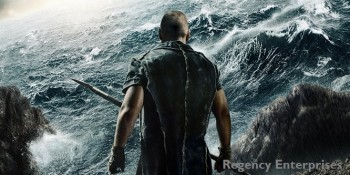Darren Aronofsky’s epic Noah, which opened this weekend, is facing considerable criticism, primarily from Christians who view it as an unfaithful rendering of the biblical story. Rather than worry about whether or not the film uses the word “God,” I prefer to view it as a successful attempt at the Jewish interpretive practice of Midrash — whether Aronofky realizes it or not — and a meditation on our modern-day limited experience with divine intervention.
Midrash is a practice that seeks answers for the questions that remain once we’re finished reading the stories in the Bible. It explores unexplored details, pushing us to think more deeply about the implications of the text.
“The Holy Scriptures abound with gaps, abrupt shifts, and odd syntax,” writes Judith Kunst in The Burning Word. “Jewish Midrash views these troubling irregularities not as accidents or errors or cultural disparities to be passed over, but rather as deliberative invitations to grapple with God’s revealed word — and by extension, to grapple with God.”
Grappling with God is at the heart of Aronofsky’s film, which presents Noah as a man of faith who, in a departure from the biblical narrative, does not hear directly from “the Creator.” The concern about God’s presence in the film is laughable — even the film’s primary antagonist, Tubal-cain, believes in and despises the Creator, for seeming to abandon humanity. Both men are forced to act with a great degree of uncertainty. Noah is compelled to make certain decisions but has no guarantee that they are, indeed, correct.
I’m glad Aronofsky held back from giving Noah a voice from heaven, because it’s not often that we get one to help guide our choices. Oftentimes, all we can do is acknowledge our imperfections, wrestle with the decisions, and move forward in faith.
The story of Noah is often reduced to cute cartoons about paired animals on a boat with a smiling, grandfatherly character taking care of them. The horrific backdrop to that scenery is the divinely-sanctioned genocide of all of humanity. If I believed the story were historically accurate (rather than an adaptation of an even older Babylonian myth), I would be terrified of the deity it reveals and wonder how the main character could allow innocent human beings to perish outside his Ark.
By filling in some of the narrative gaps that exist in the story, this film actually provides a palatable explanation for how Noah could live with himself [mild spoiler alert], positing that, in fact, he thinks God is calling him not to repopulate the earth with humans, but to rid the earth of them — he and his family included. Further, it shows how much of a struggle this is for Noah and how uncertain he is about what he feels he must do. Aronofsky presents his main character as someone who recognizes how flawed he is and is prepared to make the ultimate sacrifice in order to prevent his flaws from destroying creation.
Here, too, the film explores the ambiguity of the biblical text as it relates to the question of what the Creator has directed humans to do with creation. In the first chapter of Genesis, God creates humankind, giving them “dominion” over all the earth and commanding them to “subdue” the creatures and plants within it. The Hebrew word radah (“dominion”) is used to describe the way kings rule over their territories, while kavash (“subdue”) is used in the context of slavery. Does the Creator want humankind to rule the earth as benevolent monarchs or as heartless slaveholders? The film depicts both viewpoints, obviously coming out in favor of Noah and his message of environmental protection.
In fact, Aronofsky’s surprising lack of subtlety is far more objectionable than any liberties he may have taken with the plot. Consider the conversation between Noah and his adopted daughter, Ila, at the end of the film. He explains a choice he made, and his reasoning is exactly what we would’ve assumed it was. (If I were any more specific, it would dampen some of the climactic tension of the film.) Suffice to say: that conversation is completely unnecessary for intelligent film-goers.
Noah is a film, a story — a character — designed for anyone who’s wondered: Should I take this job? Should I marry this woman? Can I keep this baby? Is this the right college? The right city? The right treatment plan? Do I keep moving forward or try to start over?
Still, this is not a perfect film: the performances by Russell Crowe, Jennifer Connelly, and Emma Watson are great, but the script is at times heavy-handed, the special effects (especially the animals) are nowhere near Life of Pi quality, and the movie overall is weird but “not weird enough.” However, it got me thinking and kept me thinking. For several days, I continued to ponder the moral and ethical questions it posed. This film will bring you face-to-face with questions about humanity’s capacity for good and evil and about the relationship we have with the divine.
Oh, and if you’re hung up on the rock monsters, just know that they’re far from the strangest things found in the Bible.
